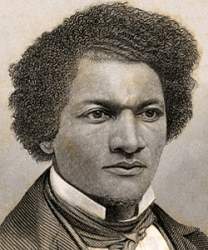Record Data
Source citation
Frederick Douglass, Life and Times of Frederick Douglass written by Himself ... (Boston, MA: DEWolfe and Fiske Company, 1892), 467-469.
Type
Letter
Date Certainty
Exact
Transcriber
John Osborne, Dickinson College
Transcription date
Transcription
The following text is presented here in complete form, as it originally appeared in print. Spelling and typographical errors have been preserved as in the original.
Washington, February 7, 1866
Mr. PRESIDENT: In consideration of a delicate sense of propriety as well as of your own repeated intimations of indisposition to discuss or listen to a reply to the views and opinions you were pleased to express to us in your elaborate speech to-day, the undersigned would respectfully take this method of replying thereto. Believing as we do that the views and opinions you expressed in that address are entirely unsound and prejudicial to the highest interests of our race as well as to our country at large, we cannot do other than expose the same and, as far as may be in our power, arrest their dangerous influence. It is not necessary at this time to call attention to more than two or three features of your remarkable address :
1. The first point to which we feel especially bound to take exception, is your attempt to found a policy opposed to our enfranchisement, upon the alleged ground of an existing hostility on the part of the former slaves toward the poor white people of the South. We admit the existence of this hostility,, and hold that it is entirely reciprocal. But you obviously commit an error by drawing an argument from an incident of slavery, and making it a basis for a policy adapted to a state of freedom. The hostility between the whites and blacks of the South is easily explained. It has its root and sap in the relation of slavery, and was incited on both sides by the cunning of the slave masters. Those masters secured their ascendency over both the poor whites and blacks by putting enmity between them.
They divided both to conquer each. There was no earthly reason why the blacks should not hate and dread the poor whites when in a state of slavery, for it was from this class that their masters received their slave catchers, slave drivers, and overseers. They were the men called in upon all occasions by the masters whenever any fiendish outrage was to be committed upon the slave. Now, sir, you cannot but perceive, that the cause of this hatred removed, the effect must be removed also. Slavery is abolished. The cause of this antagonism is removed, and you must see that it is altogether illogical (and "putting
new wine into old bottles ") to legislate from slaveholding and slave-driving premises for a people whom you have repeatedly declared it your purpose to maintain in freedom.
2. Besides, even if it were true, as you allege, that the hostility of the blacks toward the poor whites must necessarily project itself into a state of freedom, and that this enmity between the two races is even more intense in a state of freedom than in a state of slavery, in the name of heaven, we reverently ask how can you, in view of your professed desire to promote the welfare of the black man, deprive him of all means of defence, and clothe him whom you regard as his enemy in the panoply of political power? Can it be that you recommend a policy which would arm the strong and cast down the defenceless?
Can you, by any possibility of reasoning, regard this as just, fair, or wise? Experience proves that those are most abused who can be abused with the greatest impunity. Men are whipped oftenest who are whipped easiest. Peace between races is not to be secured by degrading one race and exalting another ; by giving power to one race and withholding it from another; but by maintaining a state of equal justice between all classes. First pure, then peaceable.
3. On the colonization theory you were pleased to broach, very much could be said. It is impossible to suppose, in view of the usefulness of the black man in time of peace as a laborer in the South, and in time of war as a soldier at the North, and the gi'owing respect for his rights among the people and his increasing adaptation to a high state of civilization in his native land, that there can ever come a time when he can be removed from this country without a terrible shock to its prosperity and peace. Besides, the worst enemy of the nation could not cast upon its fair name a greater infamy than to admit that negroes could be tolerated among them in a state of the most degrading slavery and oppression, and must be cast away, driven into exile, for no other cause than having been freed from their chains.
George T. Downing,
John Jones,
William Whipper,
Frederick Douglass,
Lewis H. Douglass,
and others.




